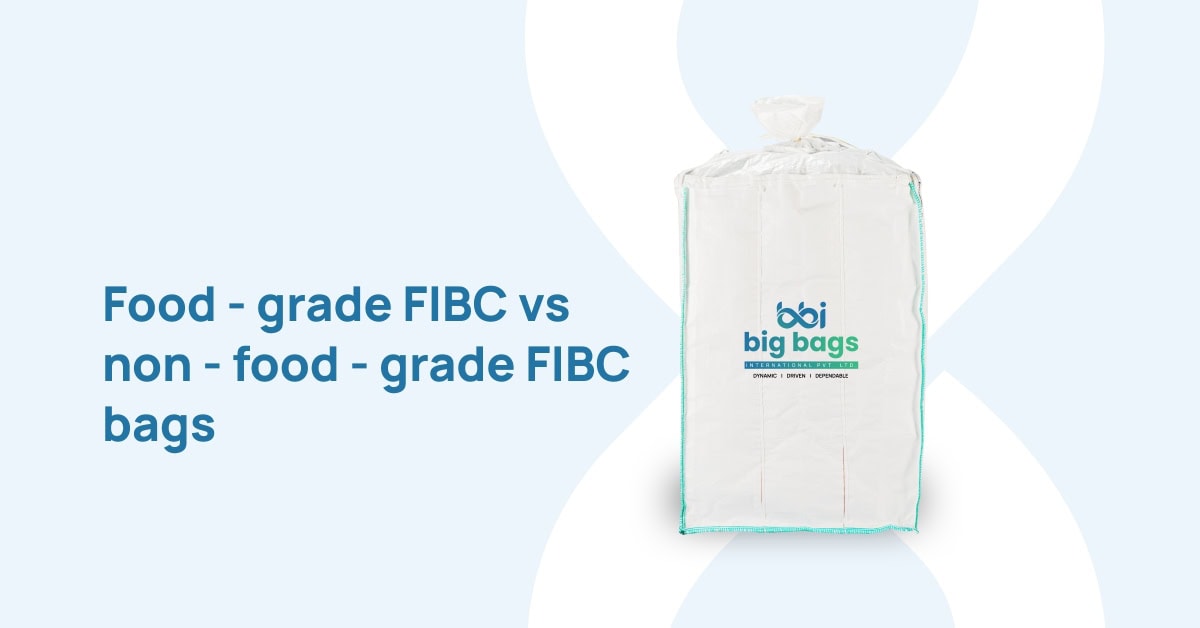Food-Grade FIBC vs. Non-Food-Grade FIBC Bags

The purpose of this blog post is to explain the criteria used to categorize FIBC bags based on their purpose.
What Is an FIBC Bag?
Before we discuss the differences between food-grade FIBC and non-food-grade FIBC bags, let’s first define what FIBC bags are. Having a strong understanding of FIBC bags and the advantages they offer is essential for any business looking to benefit from them.
FIBC bags are large containers that can be handled by mechanical equipment. They are typically made of woven polypropylene, polyethene, or polyester. Large FIBC bags are often used to transport dry, granular, or powder-type materials, while highly specialized FIBCs can be used for liquid products.
These bags offer a lot of storage capacity and are cost-effective. They’re essential for a variety of industries, including industrial products, polymers, cement, fertilizers, chemicals, and food packaging applications. FIBC bags provide businesses with reliable and efficient storage and transportation solutions for handling large quantities of dry goods and other materials.
What Is a Food-Grade FIBC Bag?
A food-grade FIBC bag is a bulk container used for the storage and transportation of dry goods, powders, granules, and other materials. Let’s look at the advantages:
- They are made of approved materials such as 100% virgin polypropylene and additives as raw materials.
- They are typically used to store dry goods such as rice, flour, sugar, etc.
- They are used for storing food meant for human consumption and should meet the hygienic storage and transportation standards set for food products.
- They must be manufactured in a hygienic production environment and follow the guidelines provided by the Global Food Safety Initiative (GFSI) standard.
- They cost more than feed-grade FIBC bags because their manufacturing process is more stringent and involves best practices like personal hygiene, pest control, and work environment control.
- They are tracked from the raw material stage to the end user using a unique ID to ensure there are no contamination issues along the way.
- They need to be customized to meet the specific needs of the food they are carrying. Transportation requirements for each type must also be considered.
- The bags should strictly follow the permissible weight guidelines. Excess weight can damage them, leading to contamination or deterioration of their contents.
What Is a Non-Food Grade FIBC Bag?
A non-food-grade FIBC bag is used to transport and store large quantities of dry bulk materials such as chemicals and hazardous materials. These bags are not suitable for storing or transporting food items as they are not manufactured under the same stringent standards as food-grade FIBCs.
What Are Feed-Grade FIBC Bags?
Then there are feed-grade FIBC bags, which are not the same as food-grade FIBC bags. Here’s how you know an FIBC bag is feed-grade:
- They are meant to hold animal products, mainly for pets and farm livestock.
- They are not certified as safe for human food. They do not have to follow the same strict guidelines as food-grade FIBC bags and may use recycled resins.
- They are not as strictly regulated as food-grade bulk bags, so they do not need to carry food-grade certifications. For this reason, they tend to cost less.
What Are the Differences Between Food-Grade FIBC and Non-Food-Grade FIBC Bags?
FIBCs play an important role in the food supply chain. Therefore, it is essential to understand the differences between food-grade and non-food-grade FIBCs:
- Food-grade FIBCs are specifically designed for contact with food products and must meet strict hygiene and safety standards.
- Non-food-grade FIBCs are designed for the transportation of non-food products and may not meet the same standards as food-grade FIBCs.
How Can I Source the Best Quality Food-Grade FIBC Bags?
Regardless of the type of bags you need, it’s important to source them from reputable FIBC manufacturers.
Big Bags International is a Mangalore-based manufacturer of top-quality FIBC bags that can help you with the safe and efficient storage and transportation of bulk goods so essential for your business. Their product range includes baffled bags, one-looper bags, ventilated bags, and diaper bags, providing reliable solutions for securing your business’s supply chain operations.
To learn more about their range of products, visit their website.
